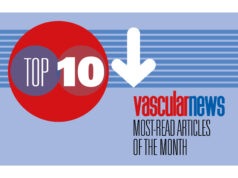
Stenting of the renal artery appears to offer no significant improvement when added to medication-based therapy, according to results from the CORAL study presented at the American Heart Association (AHA) 2013 Scientific Sessions in Dallas, USA, on 18 November 2013. The findings appeared concurrently in the New England Journal of Medicine.
According to the study’s researchers, between 1996 and 2000, there was a 364% increase in renal artery stenting procedures for Medicare beneficiaries in the USA. An estimated 78 million Americans have hypertension, according to the AHA, and as many as 3.9 million people in the United States may have renal artery stenosis.
“Renal artery stenting for this condition remains a common practice because while several, smaller studies showed negative results, other research has suggested the procedure may help lower blood pressure and stabilise kidney function,” said Christopher J Cooper, lead author of the study and chairman of the Department of Medicine at the University of Toledo, USA. “Our larger study demonstrates that this procedure offers no incremental benefit when added to treatment with medication.”
Cooper presented the results from CORAL at the AHA Scientific Sessions on behalf of the CORAL (Cardiovascular outcomes in renal atherosclerotic lesions) study investigators.
The CORAL study randomised 947 patients with ≥60% renal artery stenosis. Participants, whose average age was 69 years, had renal artery stenosis and either systolic blood pressure of 150mmHg or higher while taking two or more drugs or stage 3 (moderate) chronic kidney disease.
Researchers from more than 100 institutions randomly assigned participants to receive medical therapy only or medical therapy plus stenting. The primary endpoint was a composite of major cardiovascular or renal events (death from renal or cardiovascular causes, stroke, myocardial infarction, hospitalisation for heart failure, progressive renal insufficiency, and permanent renal replacement therapy).
During an average follow-up period of 43 months, researchers found that 35.1% of patients who received medical therapy and stents experienced one of the primary endpoints versus 35.8% of patients who received medication alone. The difference was not statistically significant (p=0.58). In a separate analysis for the secondary endpoint of cardiovascular or renal death, stroke, myocardial infarction, heart failure, progressive renal insufficiency and renal replacement, the investigators also did not see statistically significant differences. The same results were seen when the patients were analysed by subgroups.
In conclusion, Cooper said, “Renal artery stenting did not confer a benefit to the prevention of clinical events when added to comprehensive, multifactorial medical therapy in people with atherosclerotic renal artery stenosis and hypertension or chronic kidney disease.”
CORAL was funded by the National Institutes of Health, Pfizer and Cordis. The study drugs were provided by Astra Zeneca and Pfizer.













